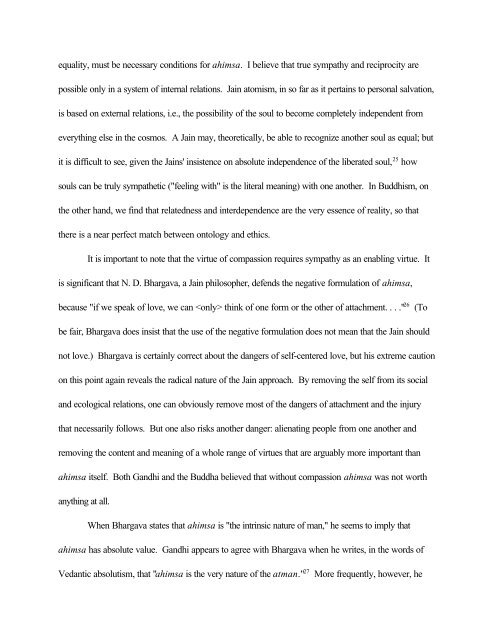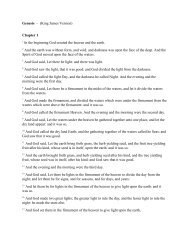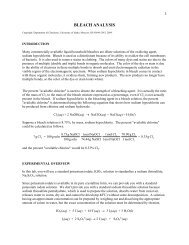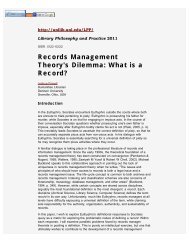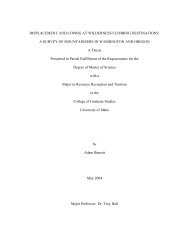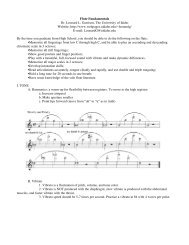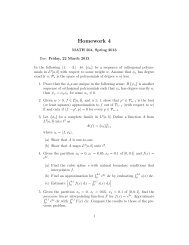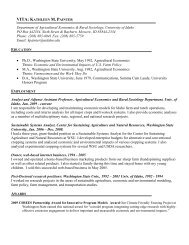Gandhi, Ahimsa, and the Self - University of Idaho
Gandhi, Ahimsa, and the Self - University of Idaho
Gandhi, Ahimsa, and the Self - University of Idaho
You also want an ePaper? Increase the reach of your titles
YUMPU automatically turns print PDFs into web optimized ePapers that Google loves.
equality, must be necessary conditions for ahimsa. I believe that true sympathy <strong>and</strong> reciprocity are<br />
possible only in a system <strong>of</strong> internal relations. Jain atomism, in so far as it pertains to personal salvation,<br />
is based on external relations, i.e., <strong>the</strong> possibility <strong>of</strong> <strong>the</strong> soul to become completely independent from<br />
everything else in <strong>the</strong> cosmos. A Jain may, <strong>the</strong>oretically, be able to recognize ano<strong>the</strong>r soul as equal; but<br />
it is difficult to see, given <strong>the</strong> Jains' insistence on absolute independence <strong>of</strong> <strong>the</strong> liberated soul, 25 how<br />
souls can be truly sympa<strong>the</strong>tic ("feeling with" is <strong>the</strong> literal meaning) with one ano<strong>the</strong>r. In Buddhism, on<br />
<strong>the</strong> o<strong>the</strong>r h<strong>and</strong>, we find that relatedness <strong>and</strong> interdependence are <strong>the</strong> very essence <strong>of</strong> reality, so that<br />
<strong>the</strong>re is a near perfect match between ontology <strong>and</strong> ethics.<br />
It is important to note that <strong>the</strong> virtue <strong>of</strong> compassion requires sympathy as an enabling virtue. It<br />
is significant that N. D. Bhargava, a Jain philosopher, defends <strong>the</strong> negative formulation <strong>of</strong> ahimsa,<br />
because "if we speak <strong>of</strong> love, we can think <strong>of</strong> one form or <strong>the</strong> o<strong>the</strong>r <strong>of</strong> attachment. . . ." 26 (To<br />
be fair, Bhargava does insist that <strong>the</strong> use <strong>of</strong> <strong>the</strong> negative formulation does not mean that <strong>the</strong> Jain should<br />
not love.) Bhargava is certainly correct about <strong>the</strong> dangers <strong>of</strong> self-centered love, but his extreme caution<br />
on this point again reveals <strong>the</strong> radical nature <strong>of</strong> <strong>the</strong> Jain approach. By removing <strong>the</strong> self from its social<br />
<strong>and</strong> ecological relations, one can obviously remove most <strong>of</strong> <strong>the</strong> dangers <strong>of</strong> attachment <strong>and</strong> <strong>the</strong> injury<br />
that necessarily follows. But one also risks ano<strong>the</strong>r danger: alienating people from one ano<strong>the</strong>r <strong>and</strong><br />
removing <strong>the</strong> content <strong>and</strong> meaning <strong>of</strong> a whole range <strong>of</strong> virtues that are arguably more important than<br />
ahimsa itself. Both <strong>G<strong>and</strong>hi</strong> <strong>and</strong> <strong>the</strong> Buddha believed that without compassion ahimsa was not worth<br />
anything at all.<br />
When Bhargava states that ahimsa is "<strong>the</strong> intrinsic nature <strong>of</strong> man," he seems to imply that<br />
ahimsa has absolute value. <strong>G<strong>and</strong>hi</strong> appears to agree with Bhargava when he writes, in <strong>the</strong> words <strong>of</strong><br />
Vedantic absolutism, that "ahimsa is <strong>the</strong> very nature <strong>of</strong> <strong>the</strong> atman." 27 More frequently, however, he


